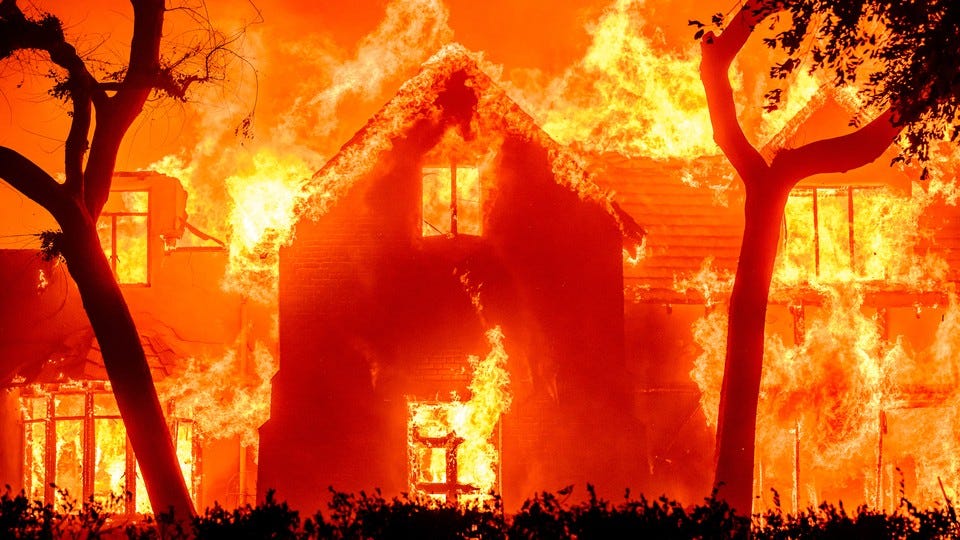When North African pirates plagued American shipping in the early 19th century, they didn't have to capture many American vessels to wreak havoc on American commerce. A few seizures sufficed. When German submarines torpedoed merchant ships in the Atlantic in World War I, the effects of the sinkings went far beyond the physical reach of the U-boats. Houthi insurgents in Yemen today can all but close the Suez Canal with moderate expenditures on armed drones.
In each case, the actions of the interdictors have been magnified by their effects on insurance markets. The actuaries of the insurance companies calculated risks and adjusted premiums accordingly. Thomas Jefferson might become incensed at the depredations of the Barbary pirates. Woodrow Wilson could denounce the German violators of American neutral rights. Leaders of the world's shipping powers can threaten destruction of the Houthis. But nothing speaks louder than rising costs of conducting business as usual.
The debate over climate change has shifted in the last decade or so. Outright deniers have grown fewer. Some have retreated to the position of acknowledging higher temperatures and fiercer storms but attributing them to natural rhythms in the earth's climate. Others grant a human role in the changes but contend that the costs of mitigation outweigh the costs of doing nothing.
Until recently the costs have been hard to quantify. They still are, because they involve actions that reach far into the future, and some depend on technology that hasn't been invented.
Yet certain costs of inaction are becoming clearer, in a specific sense. Home insurance rates have spiked upward in many places subject to extreme weather events. Hurricanes on the Gulf Coast, tornadoes in the Midwest, and wildfires in the West have increased the risk to properties there, in the reckoning of the insurance companies. Some companies have pulled out of risk-prone areas entirely, leaving the homeowners on their own and disrupting real estate markets.
Insurance isn't the only industry where money is talking on climate change. As ice in the Arctic Ocean retreats, shipping companies are rerouting their vessels to exploit passages heretofore unnavigable. The long-sought Northwest Passage from the Atlantic to the Pacific has been found. At present it's open only part of the year, but the shipping companies are ordering new ships able to exploit an extended season, eventually the whole year.
Petroleum companies are prospecting for oil in the far north in places they've never been. Other companies hope to exploit Greenland’s deposits of rare-earth minerals, deposits that are becoming more available as the Greenland ice sheet shrinks. Donald Trump is too canny to rile his political base by talking of climate change, but his interest in Greenland, surprising to many, reflects his desire to corner the mineral wealth of that big island before anyone else does.
One useful characteristic of money is that it is agnostic on political, philosophical and theological issues. Some people can be persuaded to change personal habits out of concern for the welfare of humanity. But nearly all of us are susceptible to the pinch of higher prices on our personal pocketbooks. In the 1970s, when Americans waited in line at gas stations to fill their tanks, many fretted that the world was running out of oil. Economists answered that the world would never run out of oil. If and when reserves in the ground dwindled, the price would go up, and up and up. The last barrel would never be pumped because it would be too expensive.
Scenarios of oil’s end have changed but the same principle is at work. The cash price of oil, adjusted for inflation, is lower than in the 1970s. But the total costs, including the externality costs of emitted carbon dioxide, are causing energy users to look to other sources.
Climate warriors often speak in moral terms. Some listeners are moved, others aren’t. Money, by contrast, gets everyone’s attention. The most reliable antidote to a planet growing hotter is cold cash.




Oil demand flagging? You might want to take another look at the numbers.
Burning question:
Tell me world, how will it be?
Who will end first, you or me?
Or is the question whether,
Will we all end together?